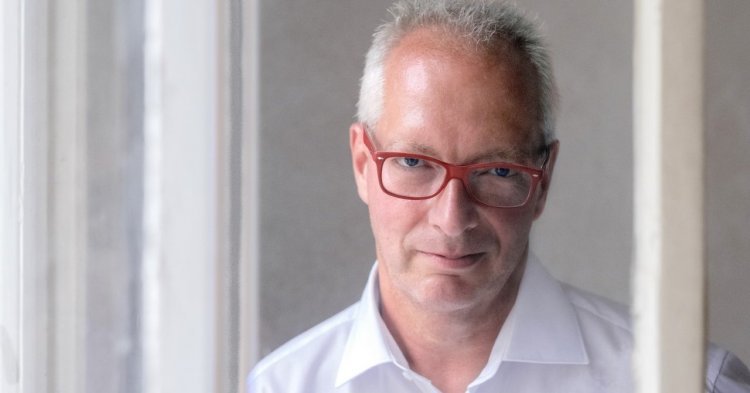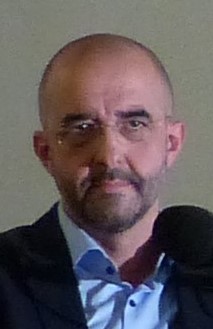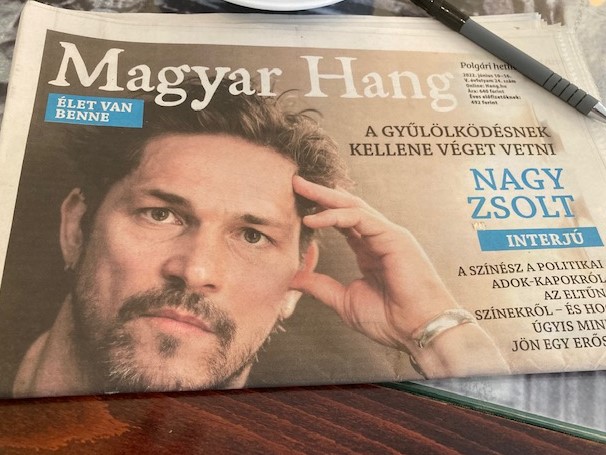The AEJ had a first-hand look at media freedom problems in Hungary during a mission in July with the Council of Europe’s Safety of Journalists Platform.
AEJ media freedom representative William Horsley looks at how a decade of restrictions and government attacks has crippled independent media and damaged coverage of politics and elections.
The “Catch 22” world of Hungary’s would-be free media
from William Horsley
July 18, 2022
Zsombor György has a Catch 22 problem. The editor in chief of Magyar Hang, Hungarian Voice, has declared that the newspaper will go out of business this summer unless it finds a fresh injection of income. In Hungary’s modest-sized domestic market, Magyar Hang is one of the two top-selling political weeklies, with over 10,000 subscribers. The editor believes if he could just cover 20 or 30 per cent of its costs through advertising the publication would survive. But that looks beyond reach because every source of those much-needed funds is closed.

In a recent interview György spoke from experience about the multiple ways in which independent media in Hungary are starved both of funds and access to information, with crippling consequences for press freedom.
In an environment distorted by over a decade of intrusive controls, barriers and aggressive smear campaigns by the ruling Fidesz party and its allies, György’s efforts to attract a modest revenue from ads have been thwarted. Government and public advertising is denied, private advertisers are scared off, and the newspaper’s presence at cultural events has often been banned. Even foreign investors have declined Zsombor György’s approaches.
Magyar Hang must also pay unusually high costs to have the paper printed abroad because Hungary’s major printing presses only serve the needs of pro-government media. The editor says the government headed by Viktor Orban considers him and his journalists “traitors” because they maintain their editorial independence. So Magyar Hang journalists are consistently denied access to press conferences and official information sources.
No “level playing field”
Other independent editors and journalists echo those complaints.

András Desi was foreign editor of Hungary’s leading national daily Népszabadság when the paper was abruptly shut down six years ago in a deal which many believe was engineered by allies of the prime minister. András says the government classifies Hungarian journalists as either “ours” and “other”, so media outlets covering politics can only survive with government support. Public TV and radio are merely “propaganda channels” for the Orban government, he adds, and the national news agency MTI is effectively under the control of the prime minister’s office.
These observations by senior Hungarian journalists are corroborated by numerous European and international sources of expertise such as the Media Pluralism Monitor (MPM), an EU-funded project run by the European Centre for Media Pluralism and Media Freedom. The Monitor’s latest annual country report on Hungary finds that the channelling of public funds only to “aligned” media distorts the public sphere and weakens media pluralism. Hungary’s ruling parties are willing, the report says, to “override any law by decree” to achieve their political goals’. And though Hungary’s Media Authority and Media Council – the key regulatory bodies – are nominally independent, in reality the ruling coalition uses its two-thirds majority in parliament to ensure that its own nominees are in sole charge of them. Opposition party candidates are not even considered.

Yet prime minister Viktor Orban’s chief government spokesman, Zoltán Kovács, brusquely rejects all suggestions that Hungary’s record on press freedom issues is anything other than good.
During an hour-long meeting in Budapest last month with visiting journalists and leading civil society representatives from across Europe, Mr Kovács consistently maintained that negative assessments of Hungary’s record on upholding media freedom, pluralism, and standards of democratic behaviour were based on “lies” and “biased opinions”. The dialogue brought some of the most contentious issues into focus.

Lop-sided media control and ownership
Since 2018 as many as 476 Hungarian media outlets have merged under the Central European Press and Media Foundation (KESMA in Hungarian), an opaque entity which is closely allied with Fidesz. The UN Special Rapporteur on Freedom of Expression, Irene Khan, harshly criticised the “unprecedented concentration of media in the hands of oligarchs friendly to the ruling party”. She also objected to the government’s claim that the merger was done as an issue of “strategic national interest”, thereby exempting the move from scrutiny by the national competition authority.
Zoltán Kovács made much of the Fidesz party’s command of a two-thirds or “constitutional” majority in parliament, and he asserted that the government’s actions were consistent with its powers arising from that dominant position. He dismissed a much-quoted estimate which put the share of pro-government media in Hungary at close to 80 per cent. Mertek, Hungary’s leading source of media analysis, published that estimate three years ago. Mertek added up the figures for KESMA, the “manifestly pro-government media outside the KESMA” and the public service media, to show that pro-Fidesz media at that time accounted for 77.8 per cent of the country’s news and public affairs media market.
Klubrádió: a symbolic case
In 2021 Hungary’s Media Council and a related court ruling set the seal on the authorities’ denial of Hungary’s last remaining independent radio station’s application to extend its broadcasting licence. The station has lost most of its audience after being forced to transmit online only.

György Ocskó, a legal adviser to the Media Council, declared that the Council is “financially and functionally independent” of the government, and that the Klubrádió decision was justified because the station had failed several times to provide required data about its on-air quota of Hungarian music. The European Commission disagrees. It has concluded that Hungary applied its national law in a discriminatory way and has opened infringement proceedings for a breach of EU law. In May this year Tilos Rádió, a community station also known for its liberal approach, was told its licence renewal was likewise refused.
Media and elections
This year Hungary’s rules on political parties’ access to public media during elections were seen to make a mockery of the principle of fair and equable treatment.
Péter Márki-Zay, the main opposition candidate in the campaign for the parliamentary elections on 3 April, was given literally only five minutes of air time during the whole campaign on the publicly-funded M1 TV channel . That drastically deprived him of the opportunity to appeal to voters, while prime minister Viktor Orban was often on air for lengthy appearances and benefited from consistently favourable coverage in all the public media.
Zoltán Kovács insisted that the campaign for the elections had been “ferocious”. He denied there was any distortion or manipulation in media coverage, and boasted that the result had “always been the same” in each of the four general elections since Mr Orban’s return to the premiership in 2010.
However the International Election Observation Mission of the OSCE (Organization for Security and Cooperation in Europe) said the election was “marred by the absence of a level playing field”. Its post-election report pointed to “bias and lack of balance in news coverage and the absence of debates between major contestants” which limited voters’ opportunity to make an informed choice.
The observers cast doubt on the fairness of the way election disputes were handled by election commissions and courts. And they drew attention to “extensive bias in a number of broadcast and online media against United for Hungary [the opposition] and in favour of the government and Fidesz” — often blurring the distinction between coverage of the government and the party.
That blurring of the distinction between state and party or private interests lies right at the heart of the Hungarian dilemma.
The precarious life of Hungary’s media – AEJ Hungary
AEJ Hungary statement on World Press Freedom Day 2021
Klubradio fights to stay on air
Does Hungary offer a glimpse of our authoritarian future? – New Yorker magazine








